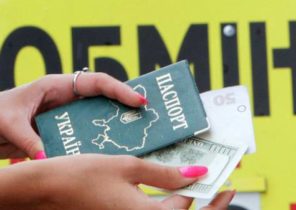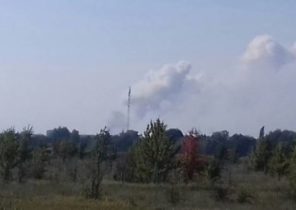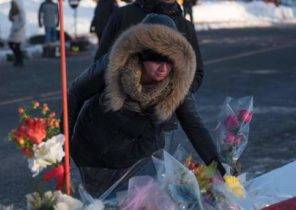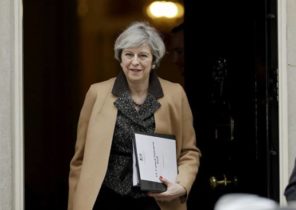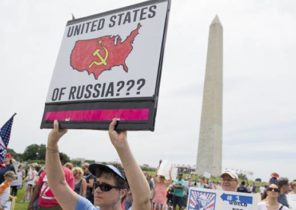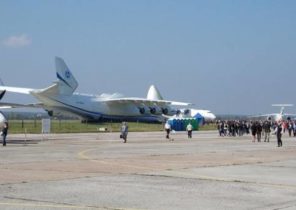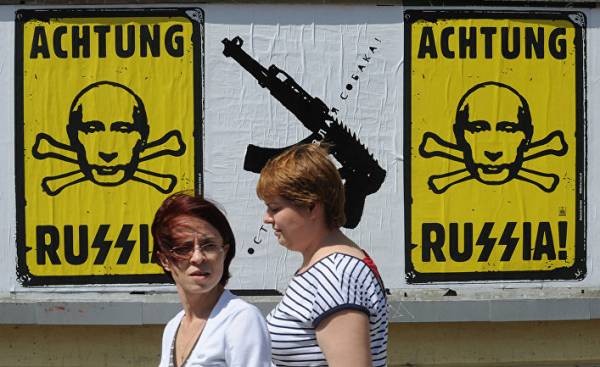
If you judge the poles exclusively in their relation to Russia, it is possible, slightly to paraphrase Fyodor Tyutchev, to say: mind the poles do not understand common yardstick can not be measured.
Modern Russophobia has no real basis. Fracture of 1989 became possible in Poland due to the changes in the USSR that was associated with the figure of Mikhail Gorbachev. The collapse of communism in the Soviet Union meant the end of the cold war. After the collapse of the state, instead of the Polish-Soviet border length in 1241 it was only a little more than 200 kilometers of the border with Russia, more precisely, with its small exclave of Kaliningrad. The dream of Jerzy Giedroyc (Jerzy Giedroyc) has become a reality: Poland separated from Russia by a strip of independent States. Moscow has not received a single inch of the prewar Polish state, but the poles acquired a 100 thousand square kilometers, which in 1945 was annexed to our country.
Phobia of phobias
In September 1993, the last soldiers with red stars on their caps left Poland. President Boris Yeltsin apologized for Katyn, Warsaw handed over key documents about the crime, helped to create in Katyn and Mednoye, the Polish military memorials. In 1999 Poland became a member of NATO, and five years later joined the European Union. Factors contributed to the good-neighbourly cooperation, however, since the early 1990s, “on the Eastern front” is constantly unfolding war.
Professor bronisław it was (Bronisław Łagowski), published in December 1999, the article stated that “in Poland prevails “animal” Russophobia, which is identified in the right circles anti-communism”. In the introduction to the collection of texts published in the journal Przegląd 1999-2016 in years (“Russian disease”), the author notes: “Russophobia is not an isolated state of consciousness, she is paired with another phobia: categorical condemnation of the circles of Solidarity of the Polish people’s Republic and the transformation of this idea in the basic dogma of Patriotic faith.”
Modern Russophobia stems from the extreme anti-communism that puts the equal sign between communism and Nazism (which is enshrined in Polish law). The differences between the Soviet Union and Russia erased, and stresses that alternate use of the adjective “Soviet” and “Russian”. In this discourse of Vladimir Putin, appears in first the KGB and then President. But in this surprising, time for politicians of the right wing of modern Poland — Poland-2, the country is run by representatives of the previous regime and the former secret services and Lech Walesa — the man from the folder “secret agent Bolek”?
The occupation of the minds
“Under the nationalist slogans and in the name of so-called memory recovery was created with the idea that the war Poland was under new occupation,” writes in the introduction to the book “the Russian disease” by its author. His contribution to the development of this concept has made the party “Civic platform” (PO). In 2009, Prime Minister Donald Tusk (Donald Tusk) has signed a decree on the establishment of the world war II Museum in gdańsk. The exposition was designed to show that the war began on 1 September 1939 in the city and ended on 4 June 1989 with a victory originated in the same movement “Solidarity”. Although the original idea was transformed, the concept of two occupations acquired the status of official.
From names that had to go through a process of de-communization, still a street of the red Army and the Liberation, and the names indicating the date of discharge a settlement. The city of Sandomierz (Sandomierz) already got rid of the street Colonel Vasiliy Skopenko, who saved the species, against which unfolds the series “Father Mateusz”, and in Warsaw there was an area of Dzhokhar Dudayev. The idea to perpetuate the memory of the rebellious Chechen General came from members of the City Council from the party “law and Justice” (PiS) a few weeks after the terrorist attack in Beslan school which claimed the lives of several hundred people.
Theory of two occupations was not invented on the Vistula: we learned it in the Baltic States. In Riga and Tallinn you can visit the museums of occupation “1940 — 1991”. The idea about the huge damage to us Russians liberating Poland, for many years imposed its mark on our relations with Moscow. Donald Tusk and Bronislaw Komorowski (Bronisław Komorowski) persuaded President Aleksander Kwasniewski (Aleksander Kwaśniewski) do not appear in Victory Day on red square. Remembering their statements, it was the Professor writes: “Trying to show that Poland will not be the only country that refused to participate in the celebration of the 60th anniversary of victory in one of the biggest wars of mankind, they referred to Lithuania, Latvia and Estonia. In Lithuania, there reigns the same paranoia that in Poland. Lithuanians seems like they continue to live under Prince Gedimin, and I can put Moscow conditions. But that’s not it: the Germans were not going to destroy the Lithuanians and other Balts, poles and other Slavs”.
Katyn religion
In the introduction to the collection of his articles it was quoting from Churchill’s speech, which he uttered in 1945 before the House of Commons: “If not for exceptional heroism and sacrifices of Russia, Poland would be doomed to complete destruction. Hitler was going to destroy not only the Polish state and the poles as a people, at the very least, turn them into slaves.”
If drawn up by Stalin the Eastern border of Poland, the allies approved early, the question of the Western frontiers remained open. “Stalin didn’t have to do gifts, especially that Western powers tried to dissuade him from it,” writes it was. Could born in the Prussian Stettin Catherine II, who made the last partition of Poland, assumed that exactly 150 years this city thanks to Russian will be in Polish borders? Such a shrewd politician could not imagine such a scenario, therefore, we cannot exclude that the future will bring a radical change.
Professor it was noted in 2011 in the journal Przegląd: “the Poles, like the Lithuanians or Estonians, negative attitude to the idea of a European-Russian Union since their national identity is based on hostility to Russia.” It should, however, add that if all the Baltic States believe the EU is the guarantor of its independence (which is why they adopted the Euro) and will defend it as their own sovereignty, then Poland under the leadership of “Law and Justice” advocated Polish independence from the EU and demands to open a Pandora’s box: to amend the treaties to strengthen the role of national States and to curb the power of the commissioners from Brussels. In Tallinn, Riga and Vilnius this position will not support.
Last autumn in the Tallinn occupation Museum showed an exhibition of the Katyn Museum (branch Museum of the Polish army) called “They were shot in the head.” An emotional story about the Katyn crime remains a cornerstone of Russophobia. In December 1999, it was the Professor, commenting on the words of the Prime Minister Jerzy Buzek (Jerzy Buzek), urging the Polish youth to arrange the trip to Katyn for example, the Israeli “March of the living” in Auschwitz, wrote about education, “hatred of Russia”. In August 2005, when the Polish Prosecutor’s office launched an investigation into the Katyn case, he predicted: “…in the next couple of decades Katyn will serve cynical politicians to nurture a new generation in the spirit of hatred towards Russia.” The question that sounds in this text is still relevant: “What we want to achieve the poles, mimicking the religion of the Holocaust and the Katyn creating a religion?”.
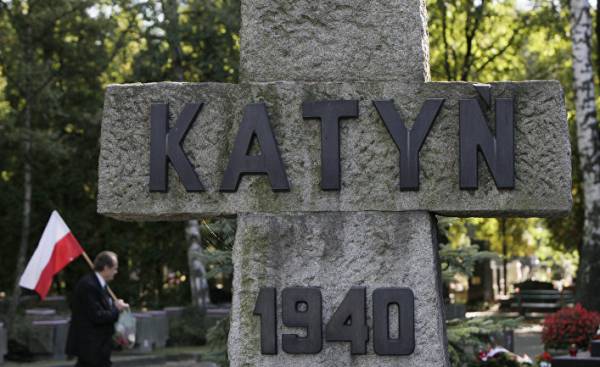 © AP Photo Czarek SokolowskiМемориал in Katyn
© AP Photo Czarek SokolowskiМемориал in Katyn
“A complex, sometimes tragic past weighs upon the peoples only when they want it”: this phrase from the same brilliant text Lugovskogo has not lost its relevance until now. Memories of the Soviet military invasion, which faced Poland, did not prevent the Czechs and Slovaks, its partners in the Visegrad four, to maintain with Russia relations to extract from them economic benefits. Even more succeeded in Hungary, with its experience in 1956, she became the only EU country, which after the annexation of Crimea had twice visited by Vladimir Putin. Poland is the only member of the Visegrad four, which tends to exacerbate relations with Moscow and the tightening of sanctions. And count on the fact that countries that support energy which are built by the Soviet Union of a nuclear power plant, will stand with us in the field of energy security (read: without Russia), at least, naive.
The enemy of my enemy
“A great love of the ruling circles towards Ukraine stems from a hatred of Russia.” It was Bronislaw wrote these words in March 2000, however, Poland continues to celebrate the idea that friends should be sought among the enemies of Moscow: both real and potential. Many years the friends of Poland were Chechens. They portrayed the mighty lone wolf, who, like the “cursed soldiers” (members of anti-Soviet armed underground in Poland in 1940-1950 years — approx. TRANS.), hiding out in the woods and leave them to throw off the yoke of Russian occupation. “Polish reaction to the murder of children in Beslan committed in the name of Chechen independence, is the evidence of the existing us anti-Russian madness”, — stated in September 2004 it was. He tried to prove that “Chechnya is not a local problem of the Russian Federation, and the front element of international Islamic terrorism.” Love to the Chechens weakened to the extent that, as to the borders of Poland was approaching carriers “of the bacilli and insects”, as well as seeking inspiration in Islam of terrorism.
Love to Georgia, to help which went along with the presidents of Ukraine and Baltic countries Lech Kaczynski (Lech Kaczyński), cooled after the defeat of Mikheil Saakashvili, who wanted to turn their country into a U.S. military base. The Georgian President and his team kicked out of the country not Russian soldiers and its own people. Saakashvili found refuge in Ukraine, but despite promises and U.S. support could not win in local corruption. It continues to flourish, and with it develops the Ukrainian historical policy, the basis for which was the Bandera, acquired the same value as the “cursed soldiers” in Poland. As part of the top of decommunization and de-Sovietization (in this area, the Ukrainians are ahead of us) Moskovsky prospect in Kiev last year was renamed the prospect of Stepan Bandera.
Poland summed up some of her old friends, but she does not lose hope to find a new one. Almighty Vice Premier Morawiecki Mateusz (Mateusz Morawiecki), Builder Intermarum and Creemore Witold Waszczykowski (Witold Waszczykowski) together with the Chairman of the Senate Stanislav by Karczewski (Stanisław Karczewski) shook in Minsk hands with Alexander Lukashenko, hoping to snatch it from the arms of Putin. Knights of the “change for the better” was not the first who made trips to Minsk. In 2010, the Minister of foreign Affairs Radoslaw Sikorski (Radosław Sikorski) met twice with Lukashenko, trying to persuade him to go “on the light side of the force”. Five years later the Ambassador of Poland to Belarus Leszek Szerepka (Leszek Szerepka) wrote in the Rzeczpospolita newspaper that the head of Polish diplomacy was naive and underestimated the Belarusian leader. The diplomat gave the followers of the Minister’s valuable advice: “don’t underestimate Lukashenka, because it’s a very skilful politician. Even if we some time will go side by side, I am convinced that in the end we were with him on the way.”
America First
But we are on the way with the United States. Minister Sikorski invited to Poland by two American armoured brigade, but so far we have arrived one. The head of the Polish government in the presence of Minister of defense and his subordinates in caps with the eagles said to come from Colorado state military: “Today is a great day. We can greet on Polish soil, here in Żagań, the American military — the lowest the best, the strongest, the most brilliant army in the world”. Beata Szydlo (Beata Szydło) is not added that the cemeteries Żagań rests several thousand soldiers “the worst class” who, according to surviving on the graves of red army soldiers memorial plaque “fell in the struggle for freedom and independence of the Polish people during the Second world war.”
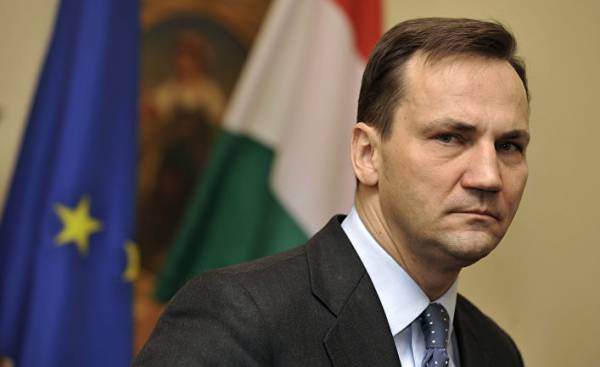 © AP Photo, Bela SzandelszkyМинистр of foreign Affairs of Poland Radoslaw Sikorski
© AP Photo, Bela SzandelszkyМинистр of foreign Affairs of Poland Radoslaw Sikorski
The us military heard that their task is to protect the independence of Poland and Europe from the encroachments of Russia. However, the commanders who give them their orders, are not in Warsaw. “A powerful military bases of a foreign power cannot serve as proof of our independence. No matter whether they are after our intense entreaties or was imposed upon us. In any case, it is an indication that we can’t afford to be independent”, — stressed in June 2013 it was. Two years later, he sarcastically added: “Militarism is the philosophy for the big powers, and not for Poland. Militarily the poles will not achieve anything, and as for our American patrons, they have established in the First and Second world war used to come, when the war was coming to an end.”
Americans know what to expect from looking at them adoringly Poland, then we can’t rely on allies, who never fought for us on Polish soil. “Something to aspire to and plan that the Americans, the poles have to take as shots or gifts, to influence which we can not”, — wrote it was in October 2007. A year later, he predicted: “Poland is being used as a pawn on this chessboard, is to live with a premonition of war, and this spirit will be permeated her whole social life. (…) “Truth” becomes what is good for America and bad for Russia.”
Decide whether the America of Donald trump that she should establish relations with Russia, to carry on with her business, to withdraw from Ukraine and to recognize the annexation of Crimea? Or Vice versa, after the call trump to return to the Peninsula, she will sell the Ukrainians lethal weapons, and then threaten Russia in the Black sea, fighter jets and submarines? The words of the American President it is difficult to take seriously, because he does not attach much importance to his statements. Poland meanwhile will remain hostage to the us and the unpredictability of American politics.
Usual delusional disorder
Polish politics after 1989 is a series of errors arising from erroneous assumptions and diagnoses. “In Polish minds entrenched the idea that between Russia and the West there is a natural hostility. (…) We do not consider such important historical facts, like what if Russia (red, white, tsarist or Soviet) and waged war with Western countries, in coalition with other Western countries. She had conflicts with one, then another government, but in the West she has always been allies,” wrote bronisław it was in March 2000.
Russophobia is a disease, the author of the journal Przegląd several times called her delusional disorder. On the portal Wykłady.org there is a description of this disease: “all types of such disorders there is a delusion that stems from a misinterpretation of the phenomena of reality. From the formally logical point of view, the signals are processed correctly, incorrect is the only one crazy basis on which to build conclusions.” In the introduction to the book “the Russian disease” it was to pay attention: “the Polish political class can not understand that Russia is not a Communist country, and that she’s not in danger.”
The threat of Poland carries megalomania, accompanied by phobias towards its neighbors and EU partners. We lose its meaning and role in international politics, and decisions relating to our country (the gas pipeline “Nord stream” to bypass Poland) or region (no Warsaw in the so-called Normandy format) are accepted without our participation. In the early 1990’s we were convinced the world that will be able to become a mediator in normalizing relations between the West and Russia, because we know it better than others. We believed that will have the status of a strong player. But now our policy is based on delusions (Creemore) and the belief that we will protect America. Russophobia undermines the image, the position and safety of Poland.

